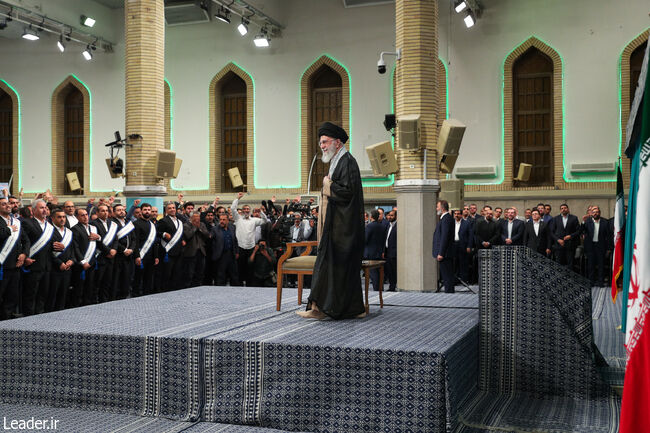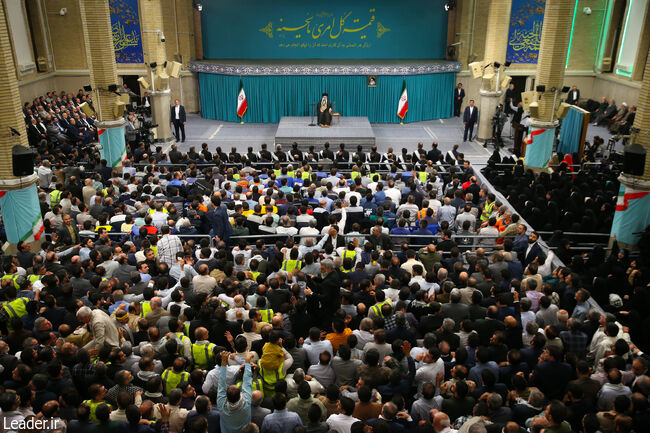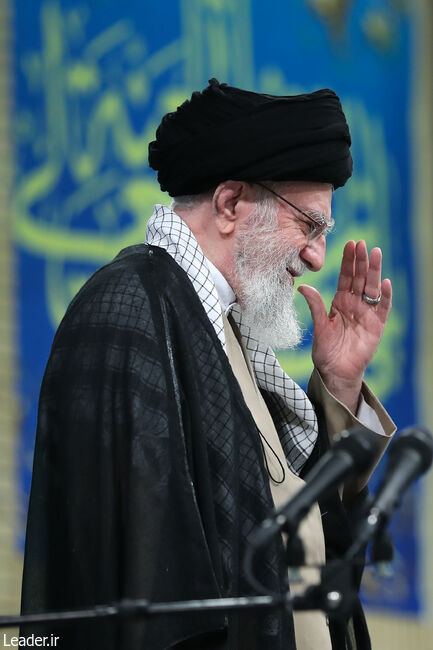During a meeting with thousands of workers on the occasion of Labour Week this morning, the Leader of the Islamic Revolution emphasised that realising the slogan of "Investment for Production" hinges on paying serious attention to workers as the most significant resource for business and one of the pillars of societal stability and continuity. He outlined essential requirements, such as ensuring job security and workplace safety for workers, enhancing their skills, and sharing production profits with them. The Leader further stressed, "The consumption of Iranian goods must become a national culture. However, alongside this cultural shift, the quality of domestic products must also improve."
Ayatollah Khamenei also pointed to the ongoing atrocities and brutal massacres of the people of Gaza and Palestine by the Zionist regime, which continues with the support of the United States and Britain. He said, "Nations must stand against the Zionist regime and its supporters and must not allow the issues concerning Palestine to be forgotten."
At the beginning of his remarks, the Leader of the Revolution extended congratulations to the audience on the auspicious anniversary of the birth of Imam Reza (as) and paid tribute to the memory of Martyr Raisi, who demonstrated a profound commitment to addressing the concerns of the people, especially workers. During this meeting, he described the statements made by the Minister of Cooperatives, Labour, and Social Welfare, which outlined the gaps and needs of the workplace and the labour community, as accurate and deserving of attention and follow-up. He added, "If the relevant officials demonstrate resolve and make decisive decisions, resolving these problems and concerns will be achievable and feasible."
The Leader of the Revolution described labour and workers' issues as being fundamentally tied to the nation's destiny. Highlighting the significance of work and workers, he said, “Beloved workers should recognise their worth, for in earning lawful sustenance through honest labour while rejecting plunder, parasitism, and encroachment on others' property, and in meeting society's needs through the production of goods and services, they embody two valuable and important human qualities that are considered virtuous in the sight of Almighty God."
In explaining the value of labour, Ayatollah Khamenei stated: "Labour is the central pillar managing and sustaining human life. Without it, society would be paralysed. Therefore, although knowledge and capital are important and influential in production, no progress can be made without workers. It is the worker who breathes life into capital."
He pointed out that the current year has been designated the "Year of Investment for Production". He identified the worker as the most important resource in the production process, and one of the pillars of social stability and sustainability. He also emphasised that financial investment alone, without the will and ability of workers, would lead nowhere, adding, "For this very reason, the enemies of society including those hostile to the Islamic Republic, have sought from the very inception of the Revolution until today, to dissuade the labour community against working within the framework of the Islamic Republic and turn workers against the system."
Recalling the efforts of communist factions to sabotage and paralyse production in the early days of the Revolution, the Leader of the Revolution declared, "The same motives still exist today, but both then and now, our workers have stood against them and delivered a firm punch to their mouths."
Stressing that preserving an important asset like the workforce requires all sectors to fulfil their responsibilities, he addressed the issue of job security for workers, stating, "The worker must know that he will continue to have his job. He should be able to plan his life and feel assured that his continued employment will not be subject to the arbitrary decisions of others."
Ayatollah Khamenei described the shutdown of some factories and production units under various pretexts in previous years as contrary to job security. He added, "For closing these units, excuses such as lack of raw materials or outdated machinery were cited, when these problems should have been remedied rather than shutting down the factories."
Referring to the sale of valuable factory lands for profiteering at the expense of ending production and dismissing workers, he stressed, "Regulatory and judicial bodies, as well as the government, must ensure such incidents are not repeated."
The Leader of the Revolution drew as an example, the revitalisation of approximately eight thousand closed and semi-operational factories during the term of Martyr Raisi's administration, stating, "This achievement demonstrated that it is possible to prevent factory closures and reductions in production capacity, which stands as one of the admirable accomplishments of that dear martyr."
Ayatollah Khamenei also addressed job security from another perspective, emphasising the necessity of ensuring job security for entrepreneurs, saying, "We must avoid creating conditions where entrepreneurs feel that their investments and capital preservation might ultimately prove detrimental to them."
He regarded ensuring worker safety as a crucial responsibility. Citing the distressing news of mining accidents in recent years, he noted, "However, according to received reports, safety issues are not limited to mines. Worker safety measures must be seriously implemented across all production units, whether through technical requirements or social security coverage; they must be seriously pursued and implemented."
Ayatollah Khamenei identified workforce upskilling as another vital duty toward the labour community. He said, "For worker training, the Technical and Vocational Training Organisation and its training centres provide excellent infrastructure. However, alongside these institutes, large corporations should also establish programs and courses to enhance workers' skills as part of their operations."
Referencing repeated emphasis on consuming domestic products as an essential means of support for workers, the Leader of the Revolution stated, "Admittedly, some people did not act correctly in this regard, but wherever it was implemented, it proved beneficial for the country. Purchasing domestically produced goods supports Iranian workers and investors, while buying foreign products essentially aids foreign workers and investors, which is contrary to both fairness and humanitarian principles."
Pointing to the high quality of some domestic products, Ayatollah Khamenei said, "We should use this to create a common culture where Iranians would consume Iranian goods, except in cases where there is no domestic production."
He criticised a letter from an institution that had been requesting the lifting of the import ban on domestically produced goods, describing the decision to open the door to imports as an easy choice but detrimental to the country and its working community. He said, "Even if a domestically produced item lacks good quality, efforts should be made to improve it. Just as a few years ago, in response to those criticising the quality of domestic cars, we said that the Iranian youth, who, despite scientific and economic blockades, can produce missiles and products that compel the enemy to stand in awe, should also be able to manufacture higher-quality and more fuel-efficient vehicles."
The Leader of the Revolution identified involving workers in sharing the profits generated from production as a vital measure benefiting both labour and the employer. This requires comprehensive and complete planning by officials, he said. He added, "When workers feel they share in the profits of production, it boosts motivation, improves quality and work precision, and ensures the long-term sustainability of the production unit for years to come."
Ayatollah Khamenei encouraged providing workers with housing through housing cooperatives or by building organised housing complexes near production units. He also addressed another point, highlighting the issue of the culture of the work environment. He said, "In Marxist philosophy, the workplace and life are arenas of conflict and hostility, where workers must oppose factory owners. It has been a misguided ideology that has stalled progress for decades, both domestically and globally. In contrast, Islam views the workplace and living environment as spaces for cooperation, collaboration, and synergy. Thus, both parties in the work environment must sincerely contribute to advancing production."
He clarified that discussions about labourers should not be limited to those in the industrial sector alone. He said, "All workers, including construction workers, agricultural labourers, fruit and vegetable market workers, and women who sell their home-based products via modern communication methods, should be considered for social security and the other aforementioned entitlements."
In the concluding section of his remarks, Ayatollah Khamenei referenced the biased policies aimed at burying the Palestinian issue. He said, "Muslim nations must not allow all kinds of rumours and irrelevant, meaningless statements to distract public attention from the issue of Palestine, Gaza, and the atrocities of the Zionist regime."
He asserted that global resistance against the Zionist regime and its supporters is imperative, stating, "The United States unequivocally supports the Zionist regime. While political rhetoric may invite alternative interpretations, the reality is that the oppressed people of Palestine and Gaza are not only confronting the Zionist regime, they are also confronting the United States and Britain, who, rather than preventing atrocities and massacres, actively empower the perpetrators by supplying them with arms and resources."
The Leader of the Revolution emphasised that transient slogans, rhetoric, and events must not eclipse the Palestinian cause. He said, "By divine grace and majesty, Palestine will triumph over the Zionist occupiers, and the fleeting dominance of this false regime will meet its end, just as their actions in Syria are not a sign of strength but rather a sign of weakness that will lead to further weakness." Ayatollah Khamenei expressed hope that the Iranian people and other believing nations will one day witness Palestine's victory over the usurpers of that land with their own eyes."
At the beginning of the meeting, the Minister of Cooperatives, Labour, and Social Welfare stated that improving the working conditions of workers is equivalent to enhancing society's overall well-being. He noted, "Workers are the driving force behind the country's economic policies, and their involvement in formulating and implementing policies is the key to advancing production and industry."
Key points in Mr. Midari's address at this meeting included: field monitoring of labour and production resolutions; targeting an 8% reduction in workplace accidents in 2025 (1404 SH); preserving workers' purchasing power; distribution of commodity vouchers; strengthening work culture by anti-middleman reforms; reducing labour community costs through education and healthcare system reforms: following-up on worker housing; and calling on the artistic community to honour the status of workers.



